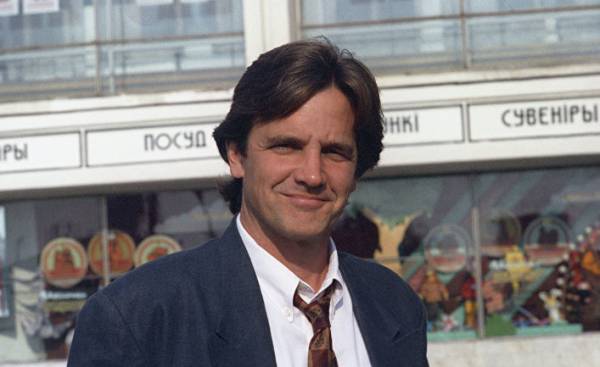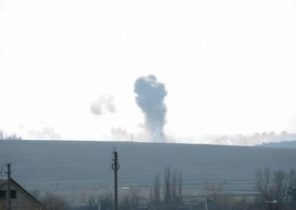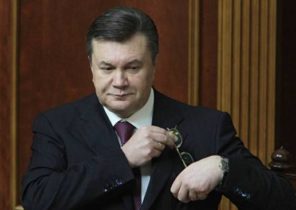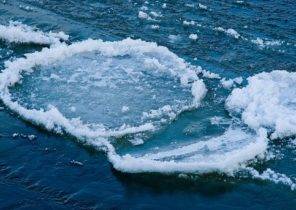
“Santa Barbara forever!” was made purple chalk inscription on the wall of an apartment building where my parents lived, in the southwest Russian city of St. Petersburg, in 1993 when I returned to the newly renamed city of my childhood and adolescence — Soviet Leningrad. It was the first in seven years, the visit from the moment of my departure to the United States. Reminders about the American soap Opera around the historic center of the city: for example, the name “Santa Barbara” are a strip bar and one of the local cheap cafes. Several times I was asked — usually women — have been there myself in Santa Barbara, and asked about it. But I, unfortunately, did not happen. “You should be. If I were lucky enough to get to America, the first thing I’d do it,” with mild reproach I said to the saleswoman, middle-aged.
Santa Barbara — sounds of course, beautiful.
In Santa Barbara people were educated and had a sense of self-worth. Men do not urinate in the hallways and wrote obscene words on the walls of the Elevator cabin. They are not broken light bulbs in the hallways and drank early in the morning cheap Cologne. They did not occupy the only toilet in a communal apartment for half an hour and not kept in the shared bath dirty shoes and improvised barrels of salted mushrooms. And, of course, they didn’t put out of pure malice pieces of lye soap into the wrong pot of soup on the stove in the common kitchen. They never came home dead drunk heavily after midnight and fell on the couch right in the Shoe, and then to snoring. Santa Barbara men were men, real men, handsome and gallant, even if in other respects good people were not. About them we cannot say that for my whole life, they never confessed their love, especially their wives — who they are, will not hide, mercilessly screwing around, but… where do without it, isn’t it? In Santa Barbara people don’t die from cirrhosis of the liver, barely exchanging sixth decade, and the quantitative difference between the sexes is not measured in millions neither there nor in America as a whole.
The beginning of the 1990s in Russia, hard times. Around a complete mess. Forever unbreakable, infinitely mighty Soviet Union no longer exists. For the first time in over 70 years, he again became Russia, and to say that it falls apart, means to say nothing. If you are an ordinary citizen whose life has already passed for the middle, there is a chance that all of your savings vanished overnight in the so-called “shock therapy” implemented by the government of Boris Yeltsin on the advice of a number of prominent American economists, one of the main ingredients of which were secret and lightning-fast monetary reform. You are, roughly speaking, were left without a livelihood, and completely disoriented. What happened? What’s going on with you and your country? And what will happen tomorrow?
Shelves of food stores emptied out stronger than ever before, even in the most bad times of Brezhnev’s stagnation era. On the radio periodically twist the popular song by the rock band “Nautilus Pompilius” in the performance of its charismatic leader Vyacheslav Butusov’s “goodbye, America, Oh, where was never…”. America? Seriously? And what is it? Nobody has the slightest idea. I would like to hope that those brilliant, world-famous American economists right here in Russia, will show us what the life in America. Everyone knows that it is incredibly good. In your room cold and blowing again flew Central heating. And outside, in the darkness of the streets and squares of your city, around makeshift campfires on his haunches, sitting sullen looking people with a dangerous glint in narrowed eyes.
You seem to hang above the boiling sea of dark entropy. (You know what “entropy”? Well, not the point). Confidence and certainty in your life a little. One of the absolute truths is “Santa Barbara”, with the most beautiful and optimistic of all.
“Santa Barbara” was the first American soap Opera that aired on Russian television. It started with 217 series 2 January 1992 and ended on series number 2 040 17 April 2002. During the first few years of the new series published three times a week in the evenings. Later it began to happen less frequently.
For 10 long years among the criminal chaos of the 90s, the first post-Soviet years, the loss of sense of time and adversity — a life in large cities and small towns, villages and snowy villages all eleven time zones of Russia came to a standstill when coming from millions of televisions the sounds of the screensaver “Santa Barbara”. In one of the commercials good-natured pharmacist told the old lady customer: “Run home, and not “Santa Barbara” miss”. It was really very important. Missed series was perceived as a personal mini-tragedy.
“Santa Barbara” has left its mark everywhere. And even entered the Russian language as a synonym for any hopelessly confusing, overly dramatic relationship. (“Oh, these two are bored with your endless Santa Barbara!”). Famous pop group Mona Lisa released super hit “Santa Barbara”, in which young women declare their eternal love for the character Mason Capwell (played by lane Davis (Lane Davies)). Countless Russian dogs and cats wore exotic names Mason, Eden, Cruz, and Sissy Capwell. Several former stars of Santa Barbara’s jed Allan (Jed Allan), lane Davies (Lane Davies), Nicolas Koster (Nicolas Coster) and others have been in Russia at different times in the 1990s and 2000s, appearing on numerous television channels, giving many interviews, and admiring the beauty of Russia, its men and women — and in General felt like the Beatles during first U.S. tour.
It was a national obsession on the verge of madness.
In Santa Barbara it never snows. There about him never even think. Minus 30 degrees in Santa Barbara, never Celsius or Fahrenheit. Residents of Santa Barbara do not know poverty. They are, for example, have no idea about what the ice batteries in the middle of January. In Santa Barbara people are not starving. Dressed in black grannies, bent Aki dwarf trees on the shore of the Arctic ocean, do not go to a rebuilt and enhanced a true capitalist grocery stores just to stare lazy eye at all those incredible dishes, which with their meager pensions can’t afford even in my wildest dreams: a foreign cheeses and sausages, fresh meat, smoked fish. In Santa Barbara not hump old women and old women is difficult to call, and certainly don’t live for months on one only black bread, hard gray army pasta, potatoes, and, if lucky, a few lumps of sugar bit of sugar to mild the Krasnodar tea, razlitom in chipped porcelain cups. When old Santa Barbara sick, bored nurses not telling them what they already lived enough and make sense to spend a very limited hospital space simply did not.
In Santa Barbara people will never, even in passing, not to speak of Russia. This makes sense: why would they think of her? But tens of millions of Russian think about the Santa Barbara quite a lot. If You are not watching “Santa Barbara”, where your perception of fashion or advice regarding lifestyle? How do you know how to decorate his luxurious mansion and what lifestyle to choose if the once illusive hopes will come true and you manage to get to America?
It’s true — not everyone is a fan of “Santa Barbara”. As they like to grumble some opponents of the series — mostly male — in the mansion and large private homes “Santa Barbara” there is no book or bookshelf. From the point of view of the Russians is unthinkable and may indeed in some measure to testify about the inner emptiness of the residents of Santa Barbara. True. But again, everyone knows that the Americans have not the rich inner world. What? Not everyone, you know, inherent characteristic of the Russian people’s innate Sverigehuset. This is the only feature, which can boast of a Russian people. Well, well, in Santa Barbara don’t read books and even, probably, do not know Tolstoy, Pushkin and Chekhov. Well, what of it? In fact, no one to care, really. Dostoevsky and Lermontov never described places like Santa Barbara! Yes, and your country any benefit from the fact that every Soviet child and adult read of these great geniuses. Compare ordinary Russian life lifestyle nikitosik people from “Santa Barbara”. What is happiness, what is “Santa Barbara”! She, at least, not drives you into depression; on the contrary, a little easier life, making it more tolerable and less distressing, hammering your head is beautiful, by definition, impossible dreams.
For all its fantastic “Santa Barbara” — your the only gate into everyday life among the endless void of the 1990s. Perhaps you never left your small town somewhere in Central Russia or Siberia, or that do not have concrete streets of neighborhoods that are typical for any big city of Russia, but you sound like you know people from “Santa Barbara” is better than their friends and relatives. Are you absolutely sure that you happen to be in Santa Barbara, why not, in another life, you would feel at home.
But the hard facts say that at this particular moment you still live in Russia, and the best option is to create your own “Santa Barbara” where you are. Fill the world around the small arches of the splash series, which the TV screen beckoning the viewer into the imaginary world of the “Santa Barbara”: let every space in your life — be it your apartment or a dull neighborhood — would be a symbolic passage in a desperate, impossible dream. And those ancient columns supporting only the air? They, too, will be here, on your windowsill or just outside the window of an apartment building, towering among the heap of post-industrial waste. And instead of sinister Soviet crimson red the main colors of your life will be purple and gold “Santa Barbara”.
In the mid-1990s across the vast country to life embodied a number of mini-Santa-Barbara — cottage villages, neighborhoods, bars, restaurants, hotels, clothing stores. Name informed about the exclusivity (one of my favorite concepts and neologisms that appeared in 1990-e years), the mysterious foreignness, belonging to a particular class of infinite and utter fashionableness. That such a simple name? All, if, like others, you wanted to live like the characters in “Santa Barbara”, but were born and still live in depressing, unpleasant place, where the real (if not real) Santa Barbara is not closer than the moon. Nothing bad can happen to a place called Santa Barbara or in it: your imagination is the good genius of your immediate life.
Therefore, the “lads” from the Western-most city, Kaliningrad — the former German Koenigsberg, occupied and annexed by the Soviet Union in 1945, the birthplace of Immanuel Kant and ex-wife of Vladimir Putin is traveling to the U.S. to yourself to carefully examine the architecture of the cottage towns like Santa Barbara’s; at least that’s the rumor. They return to Russia and bring with them a piece of “Santa Barbara”. (In one place they like the arches in the other columns and a variety of shades of gold, used in the inscriptions on the soap).
Such architectural touches can be found in all corners of the former Soviet Union, and “Santa Barbara” was one of the few elements of their common denominator. In this regard, “Santa Barbara” — as in the narrow television sense and a broader cultural aspect served as a unifying factor. In post-totalitarian societies scattered space, both visually and conceptually, it brings together spiritual kitsch — untranslatable Russian term “vulgarity” (which Vladimir Nabokov has tried with his usual inaccuracy genius translated as “posh lust” (“lust for luster”)).
Just as you can wander through the residential districts of Moscow and St.-Petersburg without the slightest idea in what city you are (as in extremely popular Soviet film “Irony of fate or with light steam!”, which for several decades has consistently broadcast in the New year’s eve), you can travel the fragmented post-Soviet geographic zones, from Kaliningrad to the Moscow region, from Moscow to the Ukrainian city of Lviv and annexed Crimea — and to observe the similarity of architectural solutions, based on the same knowledge and cultural influences, such as assigning the various institutions and spaces of the name “Santa Barbara” and its unique properties, among which the ubiquitous gilded gate, a signature of the arch and ocean views, decorated in bright blue tones on the walls, concrete apartment buildings and children’s playgrounds.
17 April 2002, the Russians watched the final episode of “Santa Barbara” at number 2 040. By the time the interest of the audience for the series had already faded. There were no parties in honor of watching the last of the series, no broken hearts. In Russia all react calmly.
The series was great while it lasted. Over the years, tens of millions of Russians, “Santa Barbara” became a parallel life, their “Thousand and one night” for nearly 2,000 episodes, week after week, month after month, year after year working life, in joy and in sorrow, to the end of the serious post-Soviet years, and the bleak beginning of Putin’s era of stability with its high — serendipitously — the price of oil.
What happened next, everyone knows: the rapid revival of Russians, the increase in the degree of their satisfaction with life, and, as a consequence, a tacit agreement with the systematic destruction of the Putin one of the democratic success of the 1990s for others, and with continuous injection into the bloodstream of the country large doses of anti-Western — particularly anti-American — poison. Having served their purpose “Santa Barbara” had to leave. A quiet farewell to the Russian “Santa-Barbara” was in a small, but noticeable extent, farewell to post-Soviet innocence, naivety, and a beautiful pipe dream of the 1990-ies. “Good-bye, America, Oh, where I’ll never…”, continued from time to time to hum under his breath Vyacheslav Butusov.
So what was in the soap Opera called”Santa Barbara” that within a decade — while the people were born and died, grew up, got married and divorced — she brought dozens of millions of Russians to utter madness? This is truly an interesting question and the short answer is: freedom. Not America as such, and not primarily the complex interactions of an infinite number of storylines, and not just a lovely rendering of the Paradise palms swaying in the wind, and not luxurious mansions with spacious, almost ridiculously beautiful and interesting people — but the feeling of absolute, unlimited freedom that fills the very atmosphere of “Santa Barbara”. For Russians, freedom was intoxicating exciting innovation — a huge, isolated and almost not known to the world and characters of “Santa Barbara” was the most that neither is a natural and self-evident: frivolous freedom to be yourself, feel independent, brave and confident, not ashamed of herself, not interested in politics, to be happy or unhappy, successful or unlucky; freedom to come and go at will, appear and disappear, travel wherever and whenever you want, without asking anyone’s permission; freedom to live without idling in long lines at the grocery or clothing stores and not just to be a resident of Santa Barbara or America, but of the whole wide world.
Perhaps that is why Russian collective nostalgia for the “Santa Barbara” continues to this day. The news Agency published a long article questioning the legacy of the show and TV and the Internet continue to mention it fondly. Nostalgia in a sense, independent people do not have enough young and less jaded life versions of themselves; they miss what was in those days, when tens of millions of Russians gathered at the screens for “Santa Barbara”. People love themselves more when they are not obliged to hate America.
We can assume that Russia is once again fascinated US and we are witnessing an interesting moment in relations between the two countries. You can also suggest that the fascination with Russia’s Donald trump understandable when viewed through the prism of “Santa Barbara”. He was the first American President that Russian viewers of the series can identify with one of the characters, and, consequently, one of the few familiar categories of Americans. Bill Clinton was too friendly and good-natured for the leader or the person was to surround the aura of sinister mystery, and his relationship with women was disgusting and vile. George W. Bush was, it seemed, insufficiently experienced to be an important character in “Santa Barbara”. In addition, in the papers, that the intelligence he did not Shine and the beautiful women of weakness is not nourished, and therefore no riddle was not in it. Barack Obama, admittedly very nice in a tuxedo, was elegant and beautiful, but, as in the case of Bush, constantly talked about his love for his wife, which, of course, very commendable, but did it a little boring, someone around whom it is difficult to build a fairly complicated storyline. Trump also perfectly fits the image of a typical American capitalist fat cats, which is firmly stuck in the collective Soviet consciousness thanks to the countless “newspaper” cartoons: a large, coarse facial features, all the time in a tuxedo, and his gigantic new York apartment — gold has many luxurious estates and glamorous novels behind him, cruel and filled with mindless determination. Yes, if you lived in the Soviet Union, Willy-nilly, and so it the American. But he, paradoxically, like Putin, and thus, to some extent, and Russia.
In General, the Russians seem to be tired constantly hear about what their Patriotic duty is to hate the Western world and the USA in particular. In Russia there is no alternative model of development of society towards democracy, except for vague references to traditional conservative values, steeped in a deep dissatisfaction with the present.
Putin still enjoys great popularity among the majority of elderly Russians, although their dissatisfaction with the stagnant (which means a permanent worsening) economic situation in the country becomes more tangible than it has been for many years, almost from the beginning of 2000-ies. And those representatives of the younger generation, who have lived their entire life under the auspices of the ossified Putin regime, protest against him more and more actively and vociferously. They are tired of what they keep back and forcibly pushed back into the past. They want to live both in Russia and in the world.
“Santa Barbara” continues to live. But graffiti “Santa Barbara forever!” on the wall of a residential building in St. Petersburg, where in 1993 my parents lived, no longer exists.
Mikhail Iossel was born in Leningrad and author of a collection of short stories “Every hunter wants to know”.







